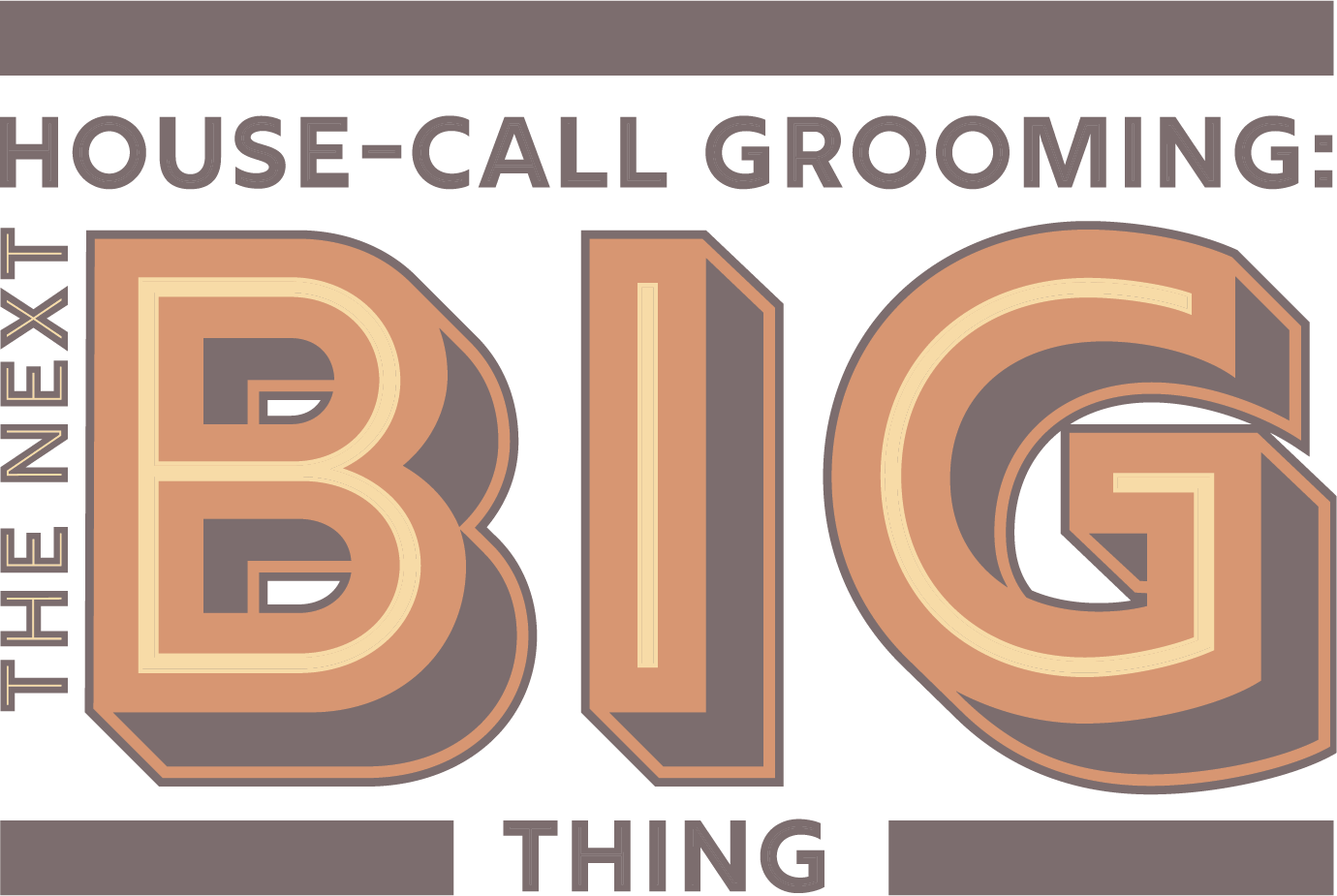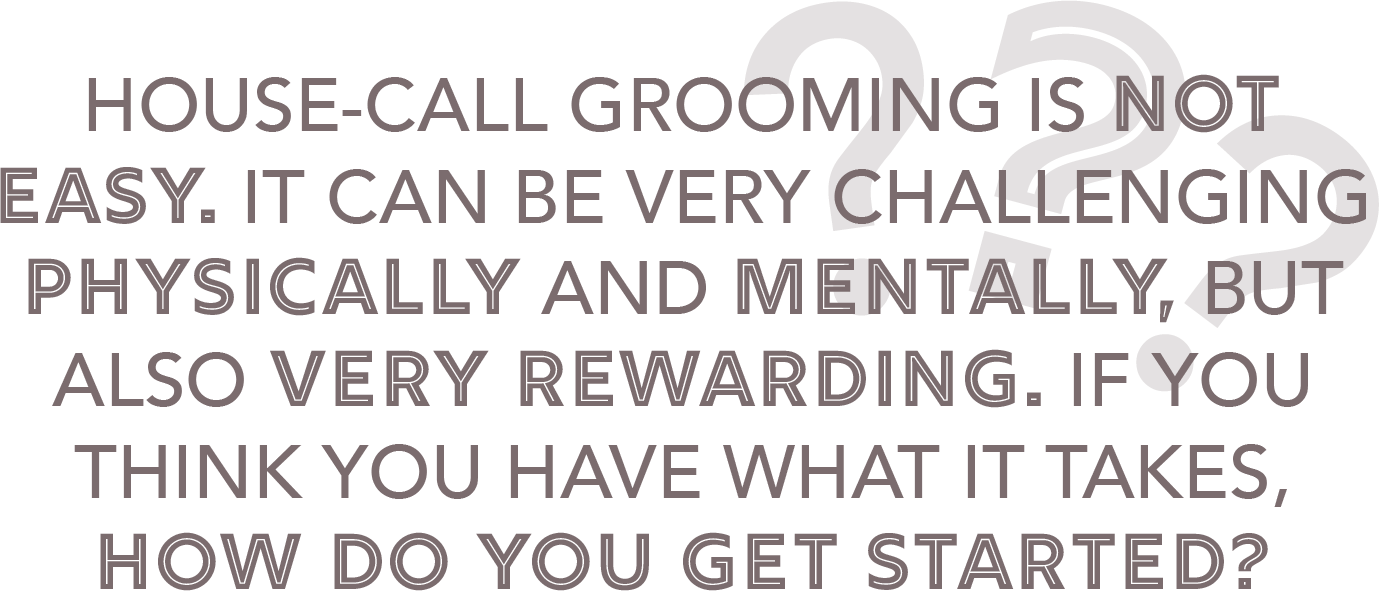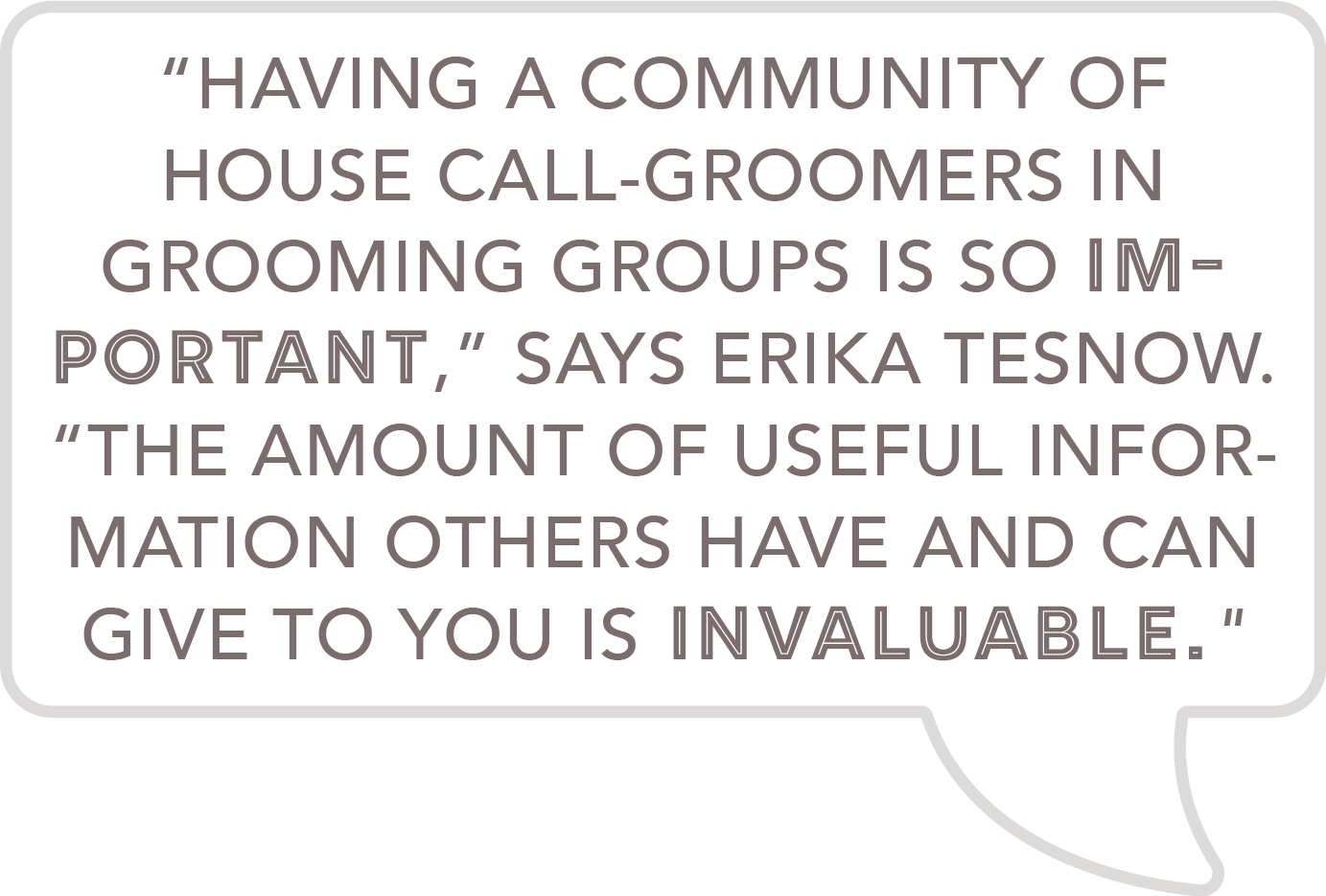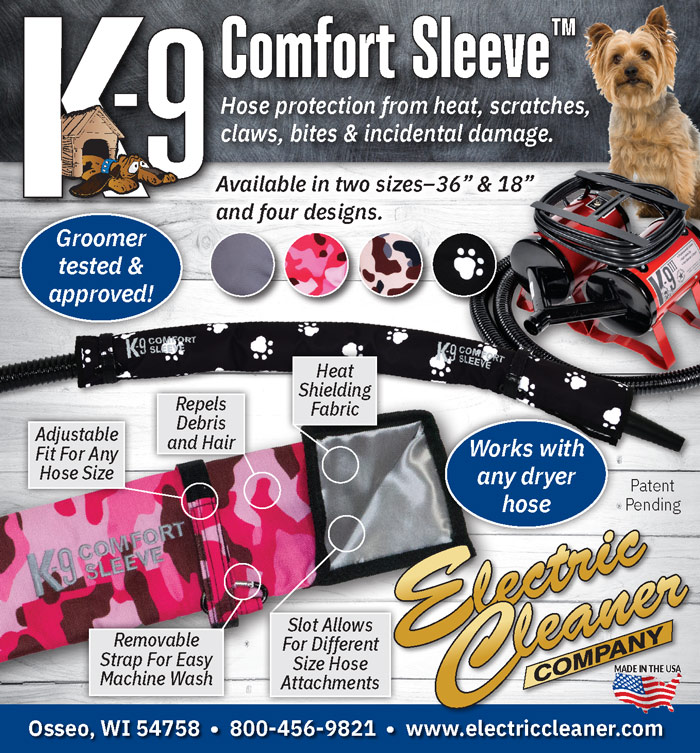
 ouse-call grooming has been around for a long time, but in the last few years it’s really come into its own, especially with the onset of the COVID-19 pandemic. Have you ever wondered how house-call grooming works and if it could be the right choice for you?
ouse-call grooming has been around for a long time, but in the last few years it’s really come into its own, especially with the onset of the COVID-19 pandemic. Have you ever wondered how house-call grooming works and if it could be the right choice for you?
I spoke with veteran house-call groomer Chris Anthony who, along with her many other accomplishments, teaches classes on the house-call model. I also contacted some other house-call groomers from around the country. Here they share some advice, pros and cons, and experiences they’ve had working in this unique model of grooming…
“Some people have the misconception that house-call grooming is not as professional as salon or mobile, or that it’s for groomers who can’t hack it in a salon,” says Chris Anthony. “Nothing could be further from the truth. House-call is a luxury service that is 100% a business.”
The other groomers I spoke with had many reasons why they chose house-call over other business models:
“There were no house-call or mobile groomers in my small town,” shares Kayla Callicotte. “I decided to take the leap. It was the best decision I could have made.”
“I wanted to have my own business and needed the option with the least overhead,” says Tasha Yvonne. “Most of my clients are so welcoming and they treat me like family.”
“I wanted freedom to make my own schedule and choose the types of dogs that I prefer to groom,” Christine Pasieka shares. “I originally wanted to purchase a mobile van but didn’t want the added monthly expense and van upkeep, especially in winter months.”
House-call grooming is not easy. It can be very challenging physically and mentally, but also very rewarding. If you think you have what it takes, how do you get started?
First you decide the size and weight limit of the dogs you will accept, and if you want to groom cats. Next you’ll map out where your service area will be. It’s best to start with a small area before you branch out.
You’ll also need to get business insurance from a company that deals with professional groomers. They can write a policy that will cover everything from a pet injury to a scuff on a client’s wall that happens when you are bringing your equipment in. And, since you will be carrying most of your equipment with you in your vehicle, you want to make sure you have adequate coverage for the vehicle and everything that is in it, should it get totaled or stolen.
When it comes to tools and styling products that you’ll use in your house-call business, try to keep it simple. Remember, you have to carry all of your equipment into the client’s house and then back out to your vehicle.

“I looked into a durable rolling bag,” Leticia Ybarra shares. “The one I decided on not only fits everything I need, but it has cup holders and seconds as a seat for me during the groom, which is a must! I put all my tools including shampoos and conditioners inside. I attach my high-velocity dryer on top and secure my table arms in the pockets. Then I can make one trip (table in one arm and rolly dragged by the other).”
“When you set up in someone’s home, try not to be near fragile knick-knacks or papers on a desk—anything that your dryer could blow off,” Chris Anthony warns. “And, when you choose your dryer, be conscious of how many amps it uses. Some are so powerful they will trip the circuit breaker in your client’s home.”
“I least like the cleanup,” Alysse Bowman says. “But I use equipment that makes it easier on me, like my 2-in-1 dryer and vacuum cleaner. Now I have less stuff to carry and a quicker clean up.”
“It’s perfectly acceptable to say to a client, ‘If you leave out your vacuum, I will clean up after myself,’” Chris Anthony adds. “You can also say, ‘I try to clean up very well, but there might be some hair left over.’ Some of my clients schedule their pet’s grooming the day before their cleaning lady comes.”
“I’m in Florida and groom big dogs, which clients prefer to do outside,” says Leticia Ybarra. “So for me, the heat is the hardest. I’ve started to find little ways to make it more tolerable for myself and the pups with multiple fans and even a cooling pad for the dog to be on during the groom.”
Another advantage of having your own house-call business is that you can set your own rules and policies.
“I don’t wash dogs in people’s homes,” says Christine Pasieka. “My policy is that the client bathes their dog the day before the appointment. I’m strictly haircut, nails, and ears.”
With house-call grooming being a female-dominated profession, going by yourself into people’s homes can be scary, but you can do things to protect yourself.
“Most of my clients are by referral,” says Molly Dunham. “When someone reaches out to me through social media, I will usually look into their profiles and see if I can get a feel for what kind of person I may be dealing with. I trust my gut. If something feels off, it’s a no go.”
“One of the least appealing things about house-call to me is the initial anxiety of new clients and having to vet them before going to their home,” Erika Tesnow shares. “I screen my clients by doing a deep Google search. I’m checking all the socials and their family’s social media accounts as well to make sure the person is legit. My state also allows for open records on arrests so I’m able to check if a person has any criminal record.”
“I’ve been lucky enough to keep most of my old salon clients, so I feel really safe and confident,” Alysse Bowman says. “For new clients, I do a $20 consultation where I travel to the home, meet the dog and owner, and discuss grooming details, etc. My significant other has my location on these occasions and if I do not feel it’s a good fit, I will not book an appointment and refer them elsewhere.”
“Your safety is paramount,” Chris Anthony adds. “Always let someone know where you are. It’s a good idea to make the call or text right in front of the client, such as, ‘I have arrived at Mary Perkins’ at 123 Main Street. I will be here for approximately one and a half hours. I’ll call you when I’m on my way to the next client.’”
“If there’s any piece of advice I could give, it would be to know your worth,” advises Autumn Onopiuk. “Surprisingly, my least favorite part of house-call isn’t cleaning up, packing, etc. I would say my least favorite is dealing with clients who don’t value my time.”
“House-call is the most convenient for the customer and the most inconvenient for the groomer. A lot of people don’t realize that you need way more ‘people skills’ when you are house-call,” shares Chris Anthony emphatically. “In a salon, you may have a receptionist and you never even speak with the client. In mobile, you talk with the client at pick-up and drop-off. The rest of the time you are alone in your van. With house-call, you are right there in their kitchen, etc. If you are not comfortable making small talk as you work, that might be a problem.
“Oftentimes, clients want to talk and talk—especially those that are homebound. You can factor in the chat time when you are pricing your services,” Chris continues. “Depending on the client and circumstances, they can pay me for the extra ‘chat time’ with money, or with cookies and a hug.”
In this day and age, the house- call groomer is no longer “alone.” There are many Facebook groups, podcasts and groomers associations to keep you connected.
“House-call grooming is so worth it,” Savana Everett says. “You have a closer relationship with dogs and their owners than you ever would in a salon. I get to see new things everyday. And, I get mental breaks between the grooms.”

“What I enjoy most is assisting animals who are afraid to be groomed in unfamiliar environments,” shares Hannah Gibson. “I’ve had numerous dogs who can’t be groomed at commercial salons, but when I’m set up in their house, I have no problems at all. After realizing how many dogs I am really helping, and seeing how happy their owners are, I don’t think I could go any other path.”
House-call grooming—are you ready to get in on the next big thing?


